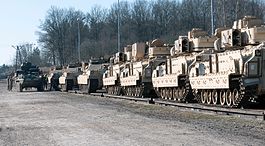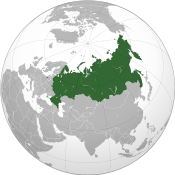Putin calls US troops in Poland 'a threat'
Friday, January 13, 2017
Reports yesterday indicated Russian President Vladimir Putin views the arrival of US troops in Poland as "a threat".

Image: Sgt. Christina Dion (US Army).
Earlier this week around a quarter of 4,000 troops earmarked for Poland crossed into Poland from Germany. Also included were trucks, tanks, and Humvees. Many are set to be based in Żagań, where Polish Prime Minister Beata Szydło and Defence Minister Antoni Macierewicz are scheduled to ceremonially welcome them tomorrow.
Part of Operation Atlantic Resolve, the deployment is set to include Abrams tanks, Bradley Fighting Vehicles, and Paladin artillery. It is the largest deployment of US troops to Europe since the Cold War ended. The presence of US assets "threatens our interests and our security," according to Putin. "It's a third country that is building up its military presence on our borders in Europe," he told the BBC. "It isn't even a European country."
Outgoing US President Barack Obama authorised the move in response to Russian intervention in Ukraine in 2014, in which Crimea was annexed. It was agreed at a NATO summit in Warsaw last year. Tomasz Szatkowski, Polish Undersecretary of State for Defence, noted "large exercises" by Russia near the Polish border as another reason the troops were needed.
Szatkowski also mentioned Russian action in Ukraine, which he called "aggressive actions in our vicinity". Russian Deputy Foreign Minister Alexei Mechkov, however, said the incoming troops and vehicles were a "factor destabilising European security". Russian Presidential spokesperson Dmitry Peskov echoed Putin, saying the troops are "a threat. These actions threaten our interests, our security. Especially as it concerns a third party building up its military presence near our borders. It's [the US], not even a European state."
Ties between Russia and the US are strained. Last month the US expelled 35 Russian diplomats accused of espionage, and sanctioned Russian intelligence agencies. This was in response to a CIA report issued two weeks earlier that concluded the Russian government hacked servers belonging to the U.S. Republican and Democratic parties. The CIA report said this was to turn the 2016 presidential election toward president-elect Donald Trump.
Since Szydło took office in 2015, Poland has also suffered a decline in relations with Russia. Within a week of the Law and Justice Party coming to power in Poland, it removed web pages featuring the results of an investigation into the Smolensk air disaster in Russia in 2010. The cause of the crash, which killed dignitaries including Polish President Lech Kaczynski, is disputed.
A Polish probe concluded the Polish pilots put safety second in their determination to get their passengers through dense fog. It also placed blame on Russian controllers for failing to divert the aircraft. Russian investigators blamed the pilots alone. The flight was carrying high-profile political figures to attend a ceremony commemorating the 70th anniversary of the Katyn massacre, when thousands of Polish prisoners of war and civilians were killed by the Soviets.
Russia has refused to return wreckage, encouraging conspiracy theories about the crash. In 2015 Szydło said in response to the vanishing investigatory findings "the website has been closed and will simply remain closed."
In recent months tension has mounted further as Russia deployed missiles to Kalingrad. The enclave, Russian territory lying between Poland and Lithuania, now has nuclear-capable Iskanders and anti-ship Bastion equipment. NATO considered these deployments a response to its own.
The US troops are set to rotate around the Balkans every nine months. Other planned host nations are Estonia, Latvia, Lithuania, Romania, Bulgaria, and Hungary. The rotation is due to a treaty with Russia preventing permanent deployment to any particular territory.
Russia-US relations face a potential thaw, as President-Elect Donald Trump moves towards office on January 20. Trump has made clear he intends to seek a closer relationship with Russia. Rex Tillerson, proposed Secretary of State for the Trump administration, implied the troops would be staying put. He said Russia had claimed Crimea "as an act of force" requiring the US to offer "a proportional show of force".
Trump's proposed Secretary of Defense, James Mattis, backed NATO before the US Senate yesterday. He said Putin aimed to weaken the NATO alliance. Witold Waszczykowski, Polish foreign minister, earlier this week remarked any improvement in US-Russia relations should avoid harming Polish interests.
Related news
- "U.S. responds to Russian election hacking with expulsions, sanctions" — Wikinews, December 31, 2016
- "New Polish government takes down findings on Russian air disaster" — Wikinews, November 26, 2015
Sources
- "US tanks and troops in Poland a threat, Russia says" — BBC News Online, January 12, 2017
- IAR. "US troops welcomed in Poland" — Radio Poland, January 12, 2017
- Ewen MacAskill. "Russia says US troops arriving in Poland pose threat to its security" — The Guardian, January 12, 2017

